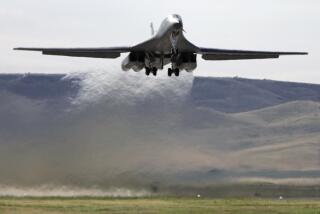2 NASA Pilots Grounded for Incidents in Off-Duty Flying
- Share via
CAPE CANAVERAL, Fla. — Two veteran shuttle commanders in training for 1991 missions were removed from their crews and grounded Monday for violating flight safety rules. One pilot was involved in a fatal collision at a weekend air show and another has been accused of flying too close to an airliner.
Navy Cmdr. Robert L. (Hoot) Gibson and Navy Capt. David M. Walker were grounded for violating the Johnson Space Center’s flight crew operations guidelines, NASA said. Gibson was grounded for one year, Walker for 60 days.
“This is the first time we have removed crew members from flights for disciplinary reasons,” NASA spokesman Jeff Carr said.
Gibson, 43, was the pilot on an eight-day Challenger mission in 1984. He commanded the 1986 Columbia mission and the December, 1988, Atlantis mission.
Walker was pilot of a space shuttle flight in 1984 and commanded the shuttle Atlantis during a four-day flight in May, 1989.
NASA said that Gibson was barred from T-38 jet trainer flights for one year and Walker was grounded for 60 days. Neither will be eligible for reassignment to a shuttle mission until he is back on T-38 flight status.
The air show crash was cited in Gibson’s case. Walker was suspended for a May, 1989, incident in which the pilot of a Pan Am Airbus 310 reported a “near mid-air collision” between the airliner and a T-38 Walker was flying at Dulles International Airport near Washington, D.C.
The Federal Aviation Administration said that air traffic controllers filed a “pilot deviation report” on Walker. It said the two planes came within 100 feet of each other vertically.
Walker will be replaced by veteran shuttle skipper Frederick Gregory for a March, 1991, military mission. A replacement was not immediately named for Gibson, whose next mission was to be launched in December, 1991.
Both men violated a rule established June 21, 1988, when Donald R. Puddy, director of flight crew operations, wrote a memo banning shuttle astronauts from participating in other high-risk activities.
“Without backup flight crews, NASA’s responsibility is to preserve the health and safety of existing, named crews,” the memo said.
More to Read
Sign up for Essential California
The most important California stories and recommendations in your inbox every morning.
You may occasionally receive promotional content from the Los Angeles Times.










